The Trump administration on Thursday ordered the expulsion from the United States of two members of Cuba’s delegation to the United Nations and restricted travel of the remaining mission members to Manhattan, drawing strong condemnation from Havana.
In an announcement just days before world leaders gather for the annual U.N. General Assembly, the State Department accused the two Cuban diplomats of trying to ‘conduct influence operations’ harmful to U.S. national security but did not elaborate on the accusations or release their names.
It was the latest sign of deteriorating U.S. relations with communist-ruled Cuba, focusing especially on Havana’s support for Venezuela’s socialist President Nicolas Maduro, since President Donald Trump took office in January 2017.
The United States is expelling two Cuban diplomats from the country’s permanent mission to the United Nations in New York City. The mission is seen in the above stock image
‘The Department of State today notified the Cuban Ministry of Foreign Affairs that the United States requires the imminent departure of two members of Cuba´s Permanent Mission to the United Nations for abusing their privileges of residence,’ State Department spokeswoman Morgan Ortagus said in statement.
‘This is due to their attempts to conduct influence operations against the United States,’ she said.
Cuban Foreign Minister Bruno Rodriguez rejected the U.S. actions as ‘unjustified,’ saying on Twitter: ‘The imputation that they might have carried out actions incompatible with their diplomatic status is a vulgar slander.’
‘The expulsion … has the aim of provoking a diplomatic spiral that would lead to the closure of bilateral embassies, further tightening of the (U.S.) blockade and creation of tensions between both countries,’ he said.
Ortagus said the movements of other members of the Cuban delegation would ‘essentially’ be limited to the island of Manhattan.
‘We take any and all attempts against the national security of the United States seriously, and will continue to investigate any additional personnel who may be manipulating their privileges of residence.’
Under the 1947 U.N. ‘headquarters agreement,’ the United States is generally required to allow access to the United Nations for foreign diplomats.

Since coming into office, President Trump has rolled back much of Barack Obama’s opening to Cuba. Trump is seen above in Otay Mesa, California on Wednesday
But Washington says it can deny visas for ‘security, terrorism, and foreign policy’ reasons, though this provision is only invoked on a limited basis.
Over the decades, Washington and Havana, old Cold War foes, have engaged in tit-for-tat expulsions of diplomats.
The Trump administration expelled 15 Cuban diplomats in September 2017 after sharply drawing down U.S. embassy staff in Havana over a mysterious affliction that Washington said had affected American personnel there.
The incidents took place from late 2016 into 2018, causing the administration of U.S. President Donald Trump to charge that diplomats were attacked by some sort of secret weapon.
Initially it was alleged that the Cuban government used a ‘sonic attack’ against the diplomats.
But a new study commissioned by the Canadian government suggested that fumigation against mosquitoes may have caused some 40 U.S. and Canadian diplomats and family members in Havana to fall ill.

The Trump administration has been pressuring Cuba to drop its support for Venezuela’s socialist president, Nicolas Maduro (seen above in Caracas in January)
The Republican president has imposed new economic sanctions on Cuba and restricted travel to the island, steadily rolling back parts of the historic opening under his Democratic predecessor, Barack Obama.
Washington has made clear that a key objective of its pressure campaign is to force Cuba to abandon Maduro, something Havana has said it will never do.
Venezuela’s political crisis deepened in January when opposition leader Juan Guaido invoked the constitution to assume a rival presidency, arguing Maduro’s May 2018 re-election was illegitimate.
He has since been recognized as the rightful leader by more than 50 countries, including the United States.
Guaido led a failed military uprising in April against Maduro, who is accused of rights violations and has overseen an economic collapse prompting millions to flee.
Trump, however, has stopped short of breaking off diplomatic relations with Cuba restored by Obama in 2015 after more than five decades of hostility.
